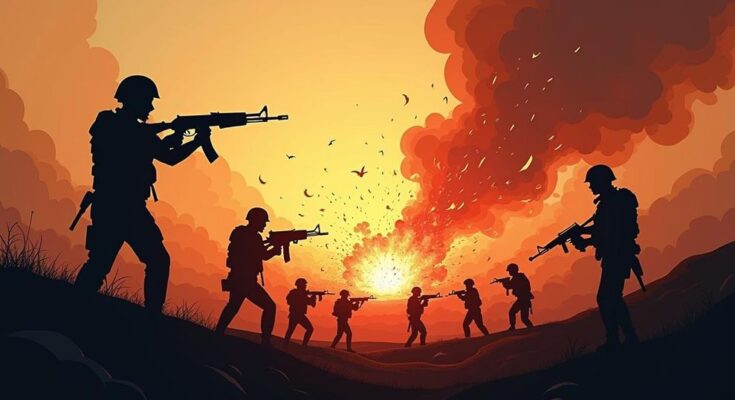Recent missile attacks by Iran against Israel indicate a dangerous escalation in hostilities that could lead to direct conflict, potentially impacting the entire Middle East and escalating to nuclear tensions. The historical dynamics between the two nations have intensified, prompting a need for careful diplomatic engagement and strategic military considerations.
Israel and Iran are currently escalating towards a potential catastrophic conflict following an unprecedented missile attack by the Iranian Revolutionary Guard Corps and the Iranian military, which launched approximately 180 missiles targeting Israeli air force bases and the Mossad headquarters. This attack was purportedly in retaliation for high-profile assassinations including that of Hezbollah leader Hassan Nasrallah and senior Hamas figure Ismail Haniyeh. Despite the majority of these missiles being intercepted through joint efforts from Israel, the United States, and Jordan, several missiles struck military and civilian sites, leading to some damage and minimal casualties. This incident marks a significant step towards direct warfare between the two nations, a situation that may have far-reaching effects across the Middle East and beyond, with potential consequences that could be both conventional and nuclear in nature. The urgency for careful decision-making is increasingly apparent, as both parties seem determined to escalate the situation. Unlike a previous attack in April, this recent offensive caught Israeli forces by relative surprise and involved a larger missile strike volume, reflecting growing Iranian concerns over its allies’ weakening status and Israel’s aggression. Iran has signaled intentions to target civilian infrastructure in future assaults, while Israeli policymakers appear poised to authorize a more vigorous response to this recent escalation. Misinterpretations of Israel’s earlier actions have contributed to Tehran’s continued aggression. The potential for increased military action against Iran is further propelled by perceptions of Iran’s leading role in a well-organized anti-Israel strategy. Discussions within Israeli circles are now considering military strikes against a variety of Iranian targets, including missile bases, air defense systems, and aspects of the Iranian energy sector. Although an attack on Iran’s nuclear infrastructure has emerged in discussions, it remains uncertain in the current climate. Several factors are presently guiding decision-making, including operational readiness, regional fallout, and the anticipated response from Iran regarding its nuclear ambitions. Additionally, Israel’s strategic calculus may now shift due to Hezbollah’s diminished threat level, making military engagement seem more viable to some policymakers amid rising domestic support for decisive action against Iranian provocations. However, continued high-stakes interactions could further entrench the discourse in Tehran supporting a nuclear weapons breakthrough, which would heighten calls in Israel for preemptive strikes on nuclear sites, potentially creating a self-perpetuating cycle of conflict. In this fraught environment, effective communication between the two nations has become critically important. A thoughtful dialogue considering diverse perspectives is essential, and the current global political climate demands diplomatic engagement rather than unilateral actions. Historical parallels, such as President John F. Kennedy’s careful deliberations during the Cuban Missile Crisis, underscore the necessity of measured responses in the face of escalating tensions.
The ongoing tensions between Israel and Iran stem from a long history of conflict, characterized by a series of proxy battles and significant military actions. Israel views Iran’s nuclear ambitions and its support of militant groups like Hezbollah and Hamas as existential threats. In recent months, Iran has ramped up its military presence and threats towards Israel, leading to fears of an all-out war that could destabilize the Middle East. The recent missile attacks signal a worrying escalation, compelling both nations to reassess their strategies and the extent of military engagement in the region.
In summary, the current trajectory of hostilities between Israel and Iran presents a precarious situation that could spiral into a broader conflict with severe implications for regional and global security. The need for strategic foresight, diplomatic communication, and careful decision-making is paramount to prevent further escalation and to address the underlying issues driving these tensions. Leaders must be cautious and deliberate, drawing lessons from history to navigate this dangerous landscape thoughtfully.
Original Source: thehill.com




